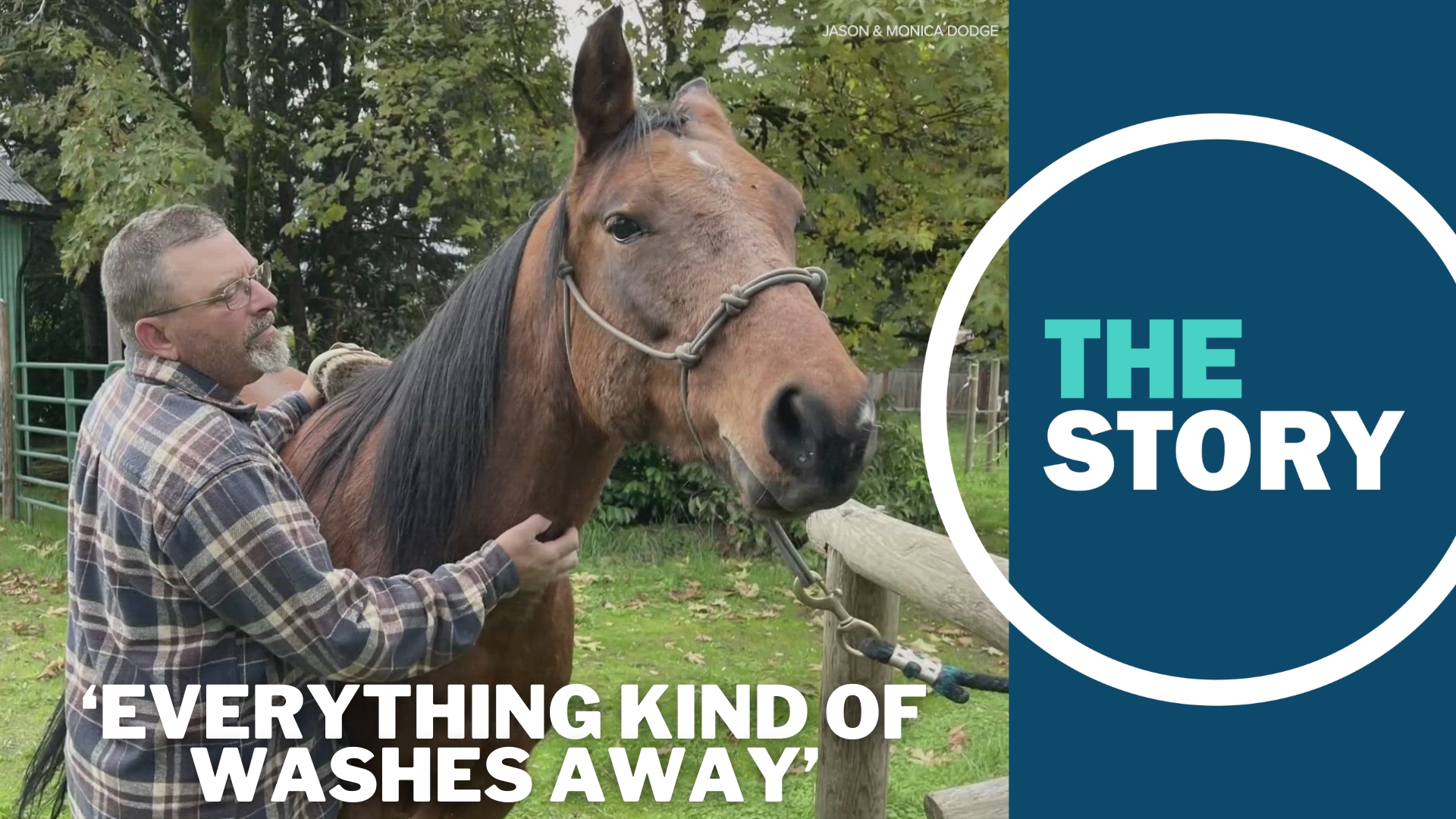TURNER, Ore. — Jason Dodge has experienced the magic of horses first-hand. Horses — including the pair he and his wife, Monica, own together at their home in Lebanon — have transformed this veteran’s life.
“Feeling them breathe. Feeling them move. Put your nose into their neck for that smell,” he said. “Sometimes, it’s hard to explain .... If I’m having a really bad day, I come (outside). And it just melts it away.”
The calm melts away memories, anxiety, and feelings from a time in his life, Jason said, that changed everything.
Jason enlisted in the Marine Corps in 1990 and served at the end of the Gulf War and in Somalia.
“Being a veteran is an honor,” he said. “We sign that blank check.”
Then, in 1994, there was an accident. Jason, who held the rank of lance corporal, was medically discharged and came home with much more than an injury that impacted his knees.
“When I came back, I was not the same person,” Jason recalled.
It would be over a decade, some 14 years give or take, before he was truly able to begin addressing the untreated trauma he said had turned to post-traumatic stress disorder, or PTSD.
“I found that I was angry a lot,” Jason remembered. “My fuse was nonexistent.”
Without treatment, Jason had trouble keeping a job. He went through a divorce. And then, in 2008, he met Monica.

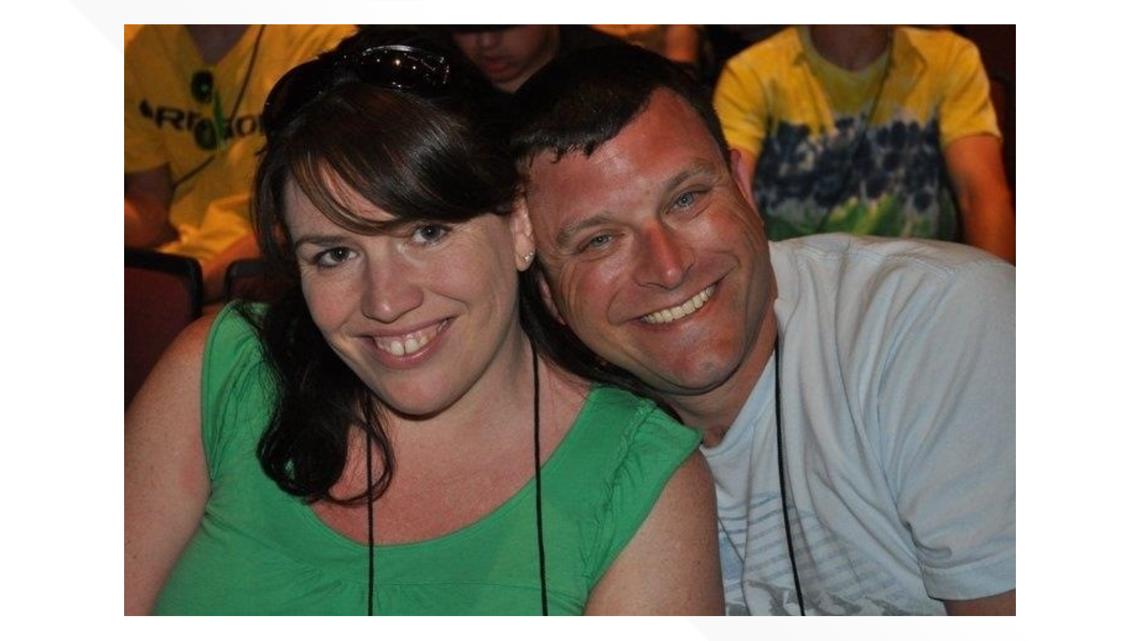
“We knew,” Monica recalled, about that first meeting at a rodeo in Redmond. “Sometimes when you know, you know.”
While visiting family, on a day not long after that, Jason mounted a horse, and started to ride.
“My sister-in-law was standing next to me,” Monica remembered. “She (said), ‘I’ve never seen (Jason’s) face that relaxed in my life.’”
How horses help find your calm
Spurred on by his first experience, and with Monica’s support, Jason found a program near Portland that paired veterans with horses. Through what’s called equine-assisted therapy, coupled with individual and group counseling, he started a long journey down the path toward healing.
“They’d ask us, ‘How are you feeling?’” Jason remembered. “Looking inside, calming yourself down. You’d calm down, then the horse would do what you want it to do.”
Because horses are prey animals that live in herds in the wild, Monica explained, they innately seek to avoid conflict and danger, and are attracted toward calming energy.
In practical terms, this means that if you’re not feeling calm, she said, a horse will reflect those feelings back — and may even back away, refusing to let you get too close.
“(It helps me figure out) what’s in the back of my head that’s making me stressed out,” Jason explained. “I’m going to let that go. And they help you do that.”
Eventually, Jason and Monica found their own young horses, which they brought home and began raising together.
Seamus, a Tobiano paint quarter horse, with a teenager’s sense of humor, is 7. Neala, an Arabian quarter horse, who is both more serious and skittish, is 6.
“They’re just everything to me,” Jason said. “They’re my lifeline.”

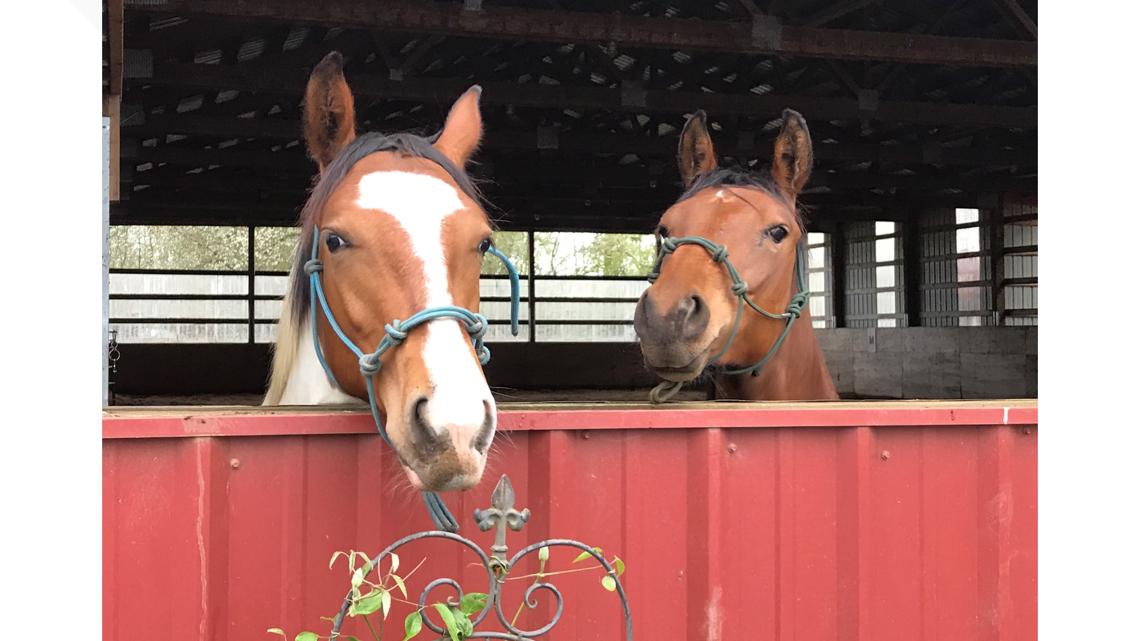
While both horses are still growing and learning, just like Jason and Monica, the Dodges say Seamus and Neala have helped transform both their lives.
For example, if Jason is feeling anxious, Neala won’t come to him, or may suddenly run out of her stall into her paddock. That daily interaction has forced him to reckon with his anger and stress levels, Jason said, and over time, boosted his feelings of confidence and calm.
“Sometimes it’s hard to explain what it does,” Jason said. “But everything kind of washes away.”
It’s a transformation, Monica said, that’s been so incredible to witness that it inspired her to go back to school to learn more about equine therapy, and to develop a program where horses could help other veterans.
“Watching somebody you love struggle really hard hits home,” Monica said. “And he’s not alone in that.”

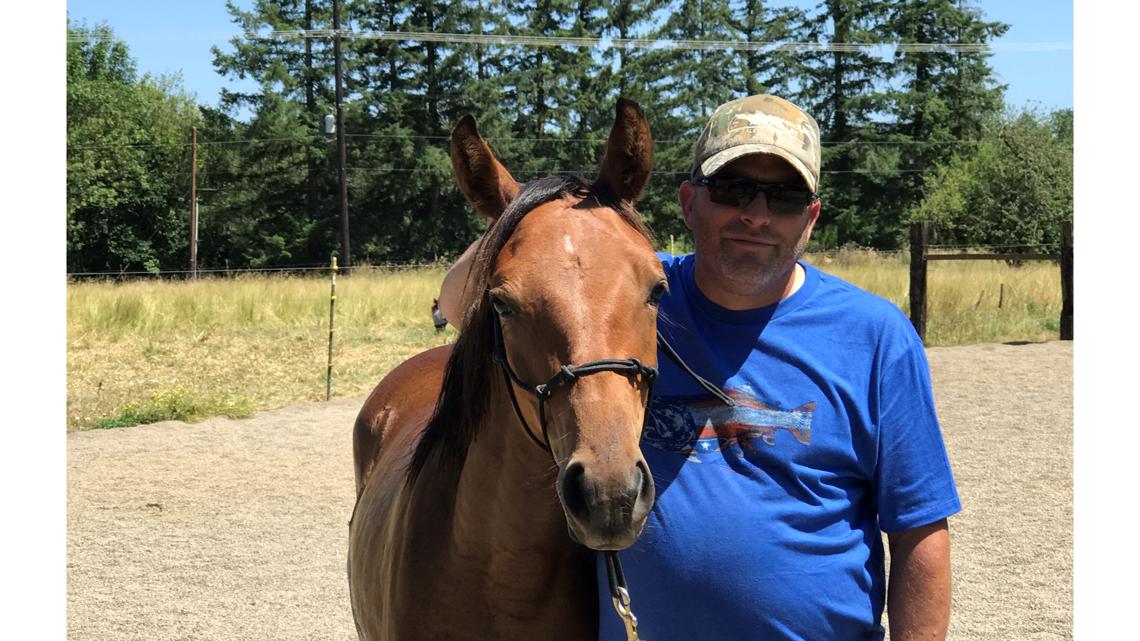
Veterans connect with their horses, each other
When KGW first met Monica Dodge last fall, she spoke about her own personal trauma, and how her connection with horses had quite literally saved her life.
“I remember kind of being able to take a breath,” Monica recalled, calling it a “kind of miracle” that helped her find hope and a path forward.
She now works to share that miracle at Horses of Hope in Turner, the nonprofit she now runs, and which she credits with saving her life.
The organization pairs people living with physical and developmental disabilities with horses, and now has a program for veterans that’s in its second year.
“I couldn’t imagine anything better that I could give back to our community,” Monica said.
The program, which includes weekly ground training and riding sessions over a 10-week period, serves about a dozen veterans at a time. It’s funded by grants and donations, which means it’s all at no cost to those who’ve served.
Participants this season include Ladell Gilmore, Jr., who served in the Navy in the late 1990s and early 2000s aboard the USS George Washington; and Gina Castillo, who served in the Army as a combat medic and finished her service just last year.

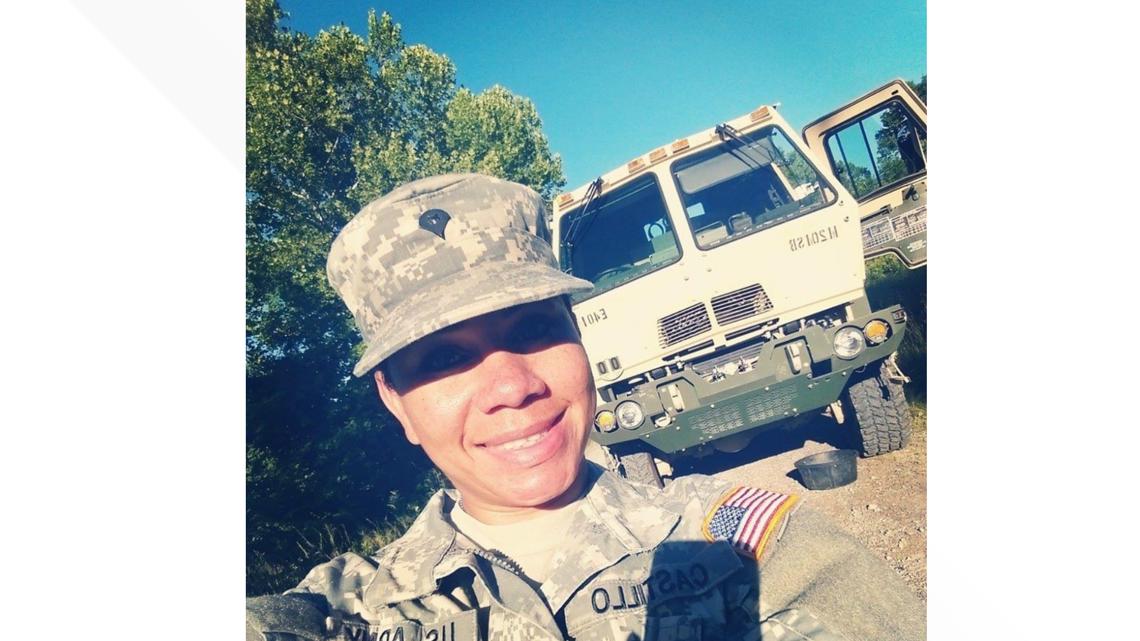
Castillo is now a readjustment counselor at the Salem Vet Center where she works one-on-one with other veterans. Gilmore, who was recently homeless for 2 years, has just moved from transitional housing into his own apartment.
“I think I interact with people a little (different),” Gilmore said. “Because I’m a high-strung person and a little stressed out.”
Castillo, who said she often gets anxious around new people and in new situations, sees the program as a chance for veterans to get in touch with their emotions and to interact with others, even if they are, at first, averse to being in a group environment.
“I hear often, when we recommend or suggest group counseling, ‘I don’t want to be around other people,’" Castillo said. “(Here), that level of connection just happens.”
From the barn into everyday life
At Horses of Hope, each Monday afternoon session begins with a meditation, where the veterans are asked to check in with their feelings and to ground themselves.
From there, it’s off to buckets and brushes. Halfway through the 10 weeks, Castillo and Gilmore have learned how to groom and tack up their horses, meaning they know how to get a saddle and bridle on, with the help of program volunteers.
Today, Castillo is riding Tony, an 18-year-old black paint, with a kind and loving personality, and who seems more interested in chewing on her helmet than being brushed.
Before she climbs aboard, she asks him to be kind.
“I need you to be gentle, okay? Don’t embarrass me, or make me embarrass myself,” she tells him.
Gilmore is riding Brewen, a bit of a showy Norwegian fjord, who tends to be more impatient than not. Brewen’s attitude makes it even more critical that Gilmore ensures he’s as calm and relaxed as possible.
“When I adjusted (my body language), he just decided to act different,” Gilmore said. “It’s natural medicine.”
Independently, and yet somehow all together, the veterans give their horses commands to walk and halt in the indoor arena. They guide them over pipes and bridges, getting them to stop in perfect squares outlined with pieces of lumber, curve around barrels, and weave in-and-out of cones.
A volunteer stays close at hand with each rider, and instructor Kendall Nickerson, who runs the sessions and has been riding her whole life, is never far away.
“I’ve definitely noticed confidence,” Nickerson said. “Crazy confidence. It’s gone way up in almost everybody.”
In a survey Horses of Hope provided to KGW, veterans who’d already been through the program self-reported a 67% drop in anxiety and depression just by being with horses.
“If you’re confident and you’re steady, you’re stable, they’re going to be a lot more willing do whatever you’re asking them to do,” Nickerson said.
And while it’s only her second or third ride, Castillo said Tony has already taught her something about herself.
“I guess I wasn’t as grounded as I thought,” she admitted. “It’s kind of like the horses soothe you, and kind of lead you into that kind of tranquility you need to be in.”
Castillo said she’s also noticed the change in Gilmore.
“He didn’t realize he was always so anxious,” Castillo said. “But once he recognized what calm felt like, it was easier to carry on outside.”
Nickerson said once the 10 weeks are up, she hopes the veterans feel like they’re better equipped to cope with life’s challenges, and that they’re open to new people and ideas.
Castillo puts it like this: “Watching vets kind of come out of their shell, find their comfort zone, find their peace.”
And as Monica Dodge looks on, and reflects on both her own and Jason’s success, she couldn’t agree more.
“There’s tons of hope here,” Monica said. “To be able to serve those that served us so unconditionally ... and they get it back unconditionally from the horses. It’s beautiful.”
Horses of Hope, which offers equine-assisted therapy to veterans and others, and serves 150+ riders weekly, is a nonprofit that relies on grants and donations. You can learn more about volunteering, sponsoring a horse, or donating to support its programs here.

